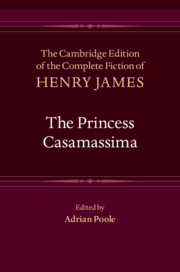Book contents
- Frontmatter
- Contents
- List of Illustrations
- Acknowledgements
- List of Abbreviations
- General Editors’ Preface
- General Chronology of James’s Life and Writings
- Introduction
- Textual Introduction
- Chronology of Composition and Production
- Bibliography
- The Princess Casamassima
- Glossary of Foreign Words and Phrases
- Notes
- Textual Variants I: Substantive Variants up to Copy Text
- Textual Variants II: Substantive Variants after Copy Text
- Emendations
- Appendix: Preface to New York Edition
XLV
Published online by Cambridge University Press: 11 April 2021
- Frontmatter
- Contents
- List of Illustrations
- Acknowledgements
- List of Abbreviations
- General Editors’ Preface
- General Chronology of James’s Life and Writings
- Introduction
- Textual Introduction
- Chronology of Composition and Production
- Bibliography
- The Princess Casamassima
- Glossary of Foreign Words and Phrases
- Notes
- Textual Variants I: Substantive Variants up to Copy Text
- Textual Variants II: Substantive Variants after Copy Text
- Emendations
- Appendix: Preface to New York Edition
Summary
“And Madame Grandoni, then?” asked Hyacinth, reluctant to turn away. He felt pretty sure that he should never knock at that door again, and the desire was strong in him to see once more, for the last time, the ancient, troubled suivante of the Princess, whom he had always liked. She had seemed to him ever to be in the slightly ridiculous position of a confidant of tragedy in whom the heroine should have ceased to confide.
“E andata via, caro signorino,” said Assunta, smiling at him as she stood there holding the door open.
“She has gone away? Bless me, when did she go?”
“It is now five days, dear young sir. She has returned to our country.”
“Is it possible?” exclaimed Hyacinth, disappointedly.
“E possibilissimo!” said Assunta. Then she added, “There were many times when she almost went; but this time — capisce—— “ And without finishing her sentence the Princess's Roman tirewoman indulged in a subtle, suggestive, indefinable play of expression, to which her hands and shoulders contributed, as well as her lips and eyebrows.
Hyacinth looked at her long enough to catch any meaning that she might have wished to convey, but gave no sign of apprehending it. He only remarked, gravely, “In short she is here no more.”
“And the worst is that she will probably never come back. She didn't go for a long time, but when she decided herself it was finished,” Assunta declared. “Peccato!” she added, with a sigh.
“I should have liked to see her again — I should have liked to bid her goodbye.” Hyacinth lingered there in strange, melancholy vagueness; since he had been told the Princess was not at home he had no reason for remaining, save the possibility that she might return before he turned away. This possibility, however, was small, for it was only nine o’clock, the middle of the evening — too early an hour for her to reappear, if, as Assunta said, she had gone out after tea. He looked up and down the Crescent, gently swinging his stick, and became conscious in a moment that Assunta was regarding him with tender interest.
- Type
- Chapter
- Information
- The Princess Casamassima , pp. 460 - 468Publisher: Cambridge University PressPrint publication year: 2020

